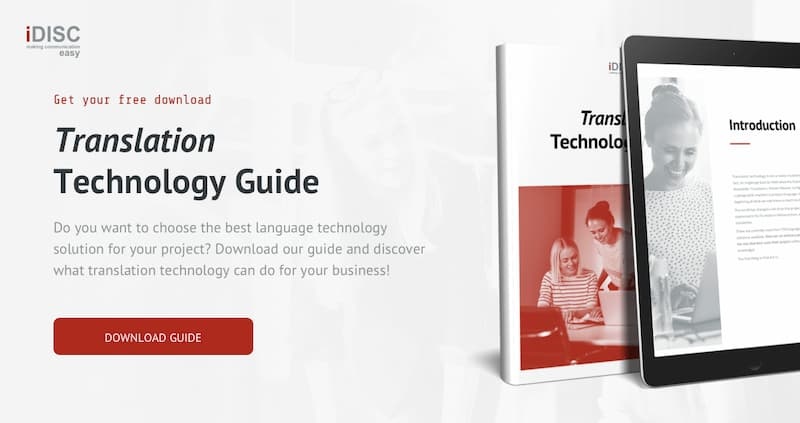Most companies in the Electronics industry understand the importance of having their content translated into the languages of the markets in which they are operating or intend to operate. Most already have their website translated, as well as their most important material, but few have a complete and appropriate solution in place.
We will tell you why it is so important to have the right translation partner, especially when it comes to the electronics industry.
When asked why they do not work with translation professionals, or why they are not happy with their current translation partner, the most common answer is not “the price”. Instead of this, the main reason is a lack of confidence in the translator’s knowledge of their technology. “How will a translator know about my industry and my terminology?” This is a recurring question and a concern many companies share, especially those in the electronics industry, due to the complications arising from the nature of their business. However, the answer is quite simple: communicating properly.
Discover the key factors for choosing your translation partner in the electronics sector
Of course, finding the right translation partner can be tricky and challenging. To do it, some important points should be taken into account. Let us have a look at the five key points to build a long-lasting and effective relationship with your translation service provider.
1. Identify the needs and scope of your project
Before you start looking for a translation partner, some internal work needs to be done to define what you want to translate, who will be in charge of the project inside the company, how much that person knows about translation, the budget you want to spend, etc. The more you define these aspects internally, the easier it will be for your translation partner or candidate to understand and meet your expectations. The right translation service provider can advise you through this definition process, so don’t hesitate to ask for advice.
2. Does the translation team really know my complex needs?
This is a major concern for many companies. The answer is simple: They don’t, not at first. What they do have to know is the industry at large. They have to be specialized in electronics and familiar with the main players (companies, associations, etc.), the main events (IFA, SEMICON, etc.) and the main media (Electronics World, Electropages, etc.). Actually, today, in consumer electronics, many brands request to work with translators that use their products, that like their brand and feel enthusiastic about being part of their team. Because they are (or they should be) part of your team!
So, how can you be certain you have found the right partner? Just test them. Give them a translation test that challenges their translation, research and writing skills. Once they pass the test and are onboarded in your translation team, you should monitor them. Have your team review their first few projects, and then share the feedback. Feedback is crucial! The more feedback you send to a translation team, the better they will know you. The final result will more accurately reflect your style and brand values.
3. Your brand is in everything you do
Gone are the times when only marketing content was written with care (as this is where a brand’s identity and values lie). In a world where the most visible content is digital, your brand shows in everything you write: your software, your instructions manual and, of course, your marketing material. Every single word you write down should be in line with the voice and image you want to share with the world. The same should happen with your translations. They are also “your identity” in that foreign market in which you operate.
So, in order to have good translations, you have to start by having a good source text. In the electronics industry, it is common to have non-natives (and non-linguists) creating content in English. The result is not always the best. This makes the translator’s work much harder because the meaning cannot be understood properly.
Try to review your source content. Especially if you plan to have it translated and it has high visibility. You will see the difference in the translation.
4. Language Lead, the guardian of quality
Many large international companies have a dedicated in-house translation department, with translators and project managers who very often come from the translation and localization industry. In some cases, they translate everything themselves and, in others, they mainly supervise and review the quality of their external translation partners. Some of these in-house translators work as Language Leads, i.e., linguists who have long-standing experience in the project and can act as guardians of the terminology, the accuracy and the style.
Small companies or start-ups do not usually have such an internal structure. That is why a reliable language service provider should cover this need. Their most experienced translator can assume that supervisory role, and provide quality assurance aligned with your expectations. Make sure you discuss this point with your translation partner and agree on the terms to have a Language Lead in your team.
5. Communication, an open circuit
Communication is the answer to the biggest concern electronics companies have when outsourcing their translations: how can my translation service provider know my brand style, technical requirements and preferred terminology? Just by talking to them, and also by listening to their advice, like an open circuit that is never complete or interrupted. Connecting your expertise in your field with their knowledge in theirs will generate the best communication flow for success.
Make sure you choose a partner that can help you understand which approach works best in any specific situation. Your relationship with your translation partner should be similar to the one you have with your marketing agency, for example.
Each company has its own unique terminology and style. The only way of having a long-lasting and worthwhile relationship with your translation service provider is through on-going communication in both directions. I hope these five points will help you to find the right translation agency. And do not hesitate to contact us if you need advice.


.jpg?width=370&height=200&name=posedicion-para-traduccion-automatica%20(1).jpg)

.jpg?width=370&height=200&name=idisc-empresa-de-traduccion-profesional%20(1).jpg)